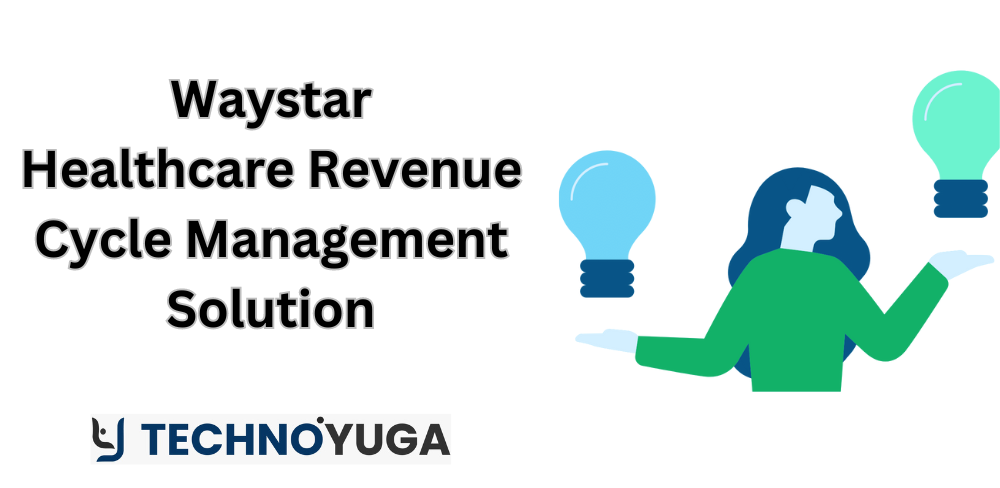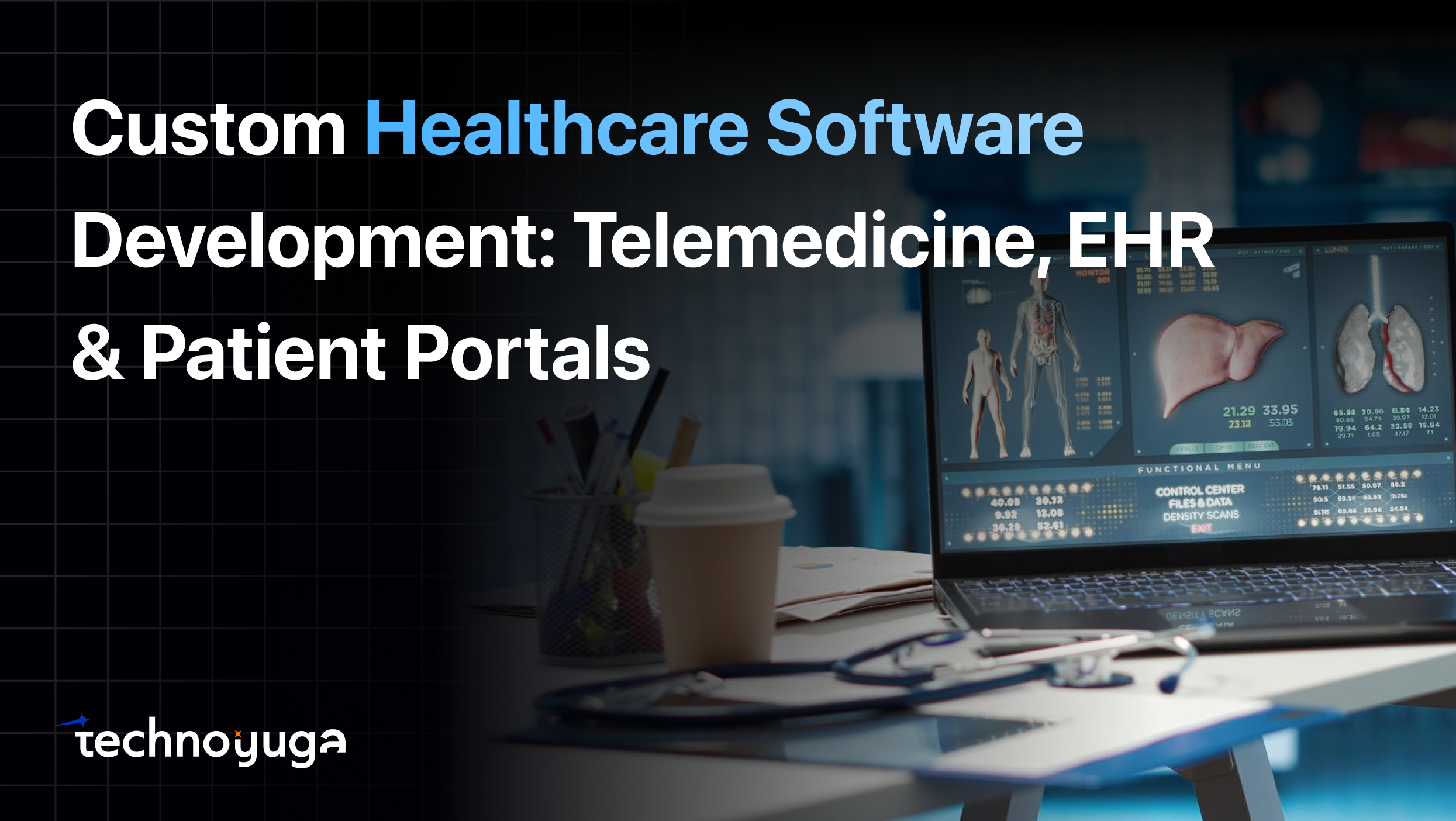In today’s competitive healthcare industry, efficient revenue cycle management is paramount for financial success and quality patient care. Here comes Waystar, a leading healthcare revenue cycle management solution that has emerged as the epitome of streamlined revenue cycle management.
With a comprehensive suite of tools and services, Waystar empowers healthcare organizations to navigate the intricacies of billing, coding, and reimbursement with unparalleled precision. This blog highlights the features and benefits that make Waystar the industry’s gold standard, exploring how its innovative approach is revolutionizing the healthcare revenue cycle.
So, let’s begin with the guide where you can discover everything about Waystar, a healthcare financial software solution.
An Overview of Waystar – Revenue Cycle Management Solution
Waystar’s Healthcare Revenue Cycle Management Solution is a comprehensive platform designed to optimize financial processes for healthcare organizations. It encompasses various tools and features to streamline the entire revenue cycle, from patient registration to payment collection.
Waystar’s RCM Solution focuses on improving operational efficiency, reducing billing errors, and accelerating revenue capture. Key components include automated claims processing, denial management, and real-time eligibility verification to enhance billing accuracy and reduce reimbursement delays.
The platform leverages advanced analytics and reporting tools, offering insights into financial performance and identifying areas for improvement. With patient-centric features, it facilitates transparent communication of financial responsibilities, improving patient satisfaction.
How Does Waystar App Work?
If you are planning for healthcare financial software development like Waystar, you must know how such applications work. Here is a simplified process of how Waystar app works.
1. Patient Registration
The process begins with patient registration, where relevant demographic and insurance information is collected. Waystar’s platform may offer tools for efficient and accurate data entry, ensuring that patient details are captured comprehensively.
2. Insurance Verification
Waystar’s app likely includes features for real-time insurance eligibility verification. This step helps prevent claim denials by ensuring that the patient’s insurance information is accurate and valid, reducing billing errors and improving the overall revenue cycle.
3. Claims Processing
Automated claims processing is a critical component. The Waystar app streamlines the creation and submission of claims, utilizing advanced technology to ensure accuracy and compliance with coding and billing standards. This helps accelerate the reimbursement process.
4. Denial Management
The platform likely includes tools for denial management, identifying and addressing issues that could lead to claim denials. Proactive denial management helps healthcare providers resolve issues promptly, reducing delays in reimbursement and improving cash flow.
5. Analytics and Reporting
Waystar’s app provides analytics and reporting features, offering insights into the financial performance of the healthcare organization. Users can access data-driven reports to monitor key metrics, identify trends, and make informed decisions to optimize the revenue cycle continually.
This is how the Waystar mobile app development project work and ensures streamlined healthcare management.
Why Develop A Healthcare Revenue Cycle Management Solution Like Waystar?
Developing a Healthcare Revenue Cycle Management solution, similar to Waystar or any other established platform, can offer several benefits to businesses operating in the healthcare industry. Here are some reasons why businesses might consider developing Waystar healthcare technology.
1. Improved Financial Performance
RCM solutions streamline the billing and payment processes, reducing errors and delays. It leads to faster reimbursement and improved cash flow for healthcare providers. So, if you want to ensure seamless and streamlined healthcare payment integrity, there is no better way than Waystar.
2. Enhanced Efficiency
Automation of various tasks in the revenue cycle, such as claims processing, coding, and payment posting, can significantly increase operational efficiency. It allows healthcare providers to focus on patient care rather than administrative tasks.
3. Reduced Billing Errors
RCM solutions employ advanced algorithms and checks to minimize billing errors. It helps in preventing claim denials and rejections, ensuring that healthcare providers receive full reimbursement for the services provided.
4. Compliance and Regulations
Healthcare billing involves complex regulatory requirements. RCM solutions can help businesses stay compliant with healthcare regulations, reducing the risk of legal issues and penalties.
5. Patient Satisfaction
A well-implemented RCM solution can lead to a smoother billing process, transparent communication with patients regarding their financial responsibilities, and faster resolution of billing inquiries. It contributes to higher patient satisfaction.
6. Data Analytics and Reporting
RCM solutions often come with robust reporting and analytics capabilities. Businesses can leverage these features to gain insights into their financial performance, identify trends, and make informed decisions to optimize revenue cycles.
7. Interoperability
Integrating an RCM solution with other healthcare systems, such as electronic health records (EHRs) and practice management systems, promotes interoperability. It ensures seamless data exchange and a more comprehensive view of patient information.
Step-by-Step Guide for Healthcare Revenue Cycle Management Solution Like Waystar
Developing a healthcare management solution like Waystar involves a comprehensive and systematic approach to address the intricate challenges within the healthcare revenue cycle. Below are the seven key steps to guide you through the development process, as mentioned by healthcare app development company professionals.
Step 1: Needs Assessment and Planning
Begin by conducting a thorough needs assessment of the healthcare industry, identifying pain points and challenges faced by healthcare providers. Collaborate with industry experts, stakeholders, and end-users to gather insights. Develop a detailed project plan outlining goals, timelines, and resource requirements.
Step 2: Regulatory Compliance and Standards
Understand and adhere to healthcare regulations and industry standards such as HIPAA, ICD-10, and CPT coding. Ensure that the solution is designed to accommodate evolving regulatory requirements, promoting compliance and mitigating legal risks.
Step 3: System Architecture and Design
Create a robust system architecture that integrates seamlessly with existing healthcare systems like Electronic Health Records (EHRs) and Practice Management Systems. Design a user-friendly interface for healthcare professionals, administrators, and patients. Prioritize scalability and flexibility to accommodate future enhancements.
Step 4: Data Security and Privacy
Implement stringent security measures to safeguard sensitive healthcare data. Utilize encryption, access controls, and authentication protocols to ensure data integrity and confidentiality. Comply with industry best practices to enhance overall data security and privacy. If you find the process difficult, hire dedicated developers from a leading firm.
Step 5: Integration and Interoperability
Ensure interoperability by integrating the healthcare management solution with various systems, allowing for seamless data exchange. Establish connections with payers, clearinghouses, and other stakeholders to facilitate a smooth flow of information. Prioritize compatibility with industry standards like HL7 and FHIR.
Step 6: Testing and Quality Assurance
Conduct thorough testing at every stage of development to identify and rectify potential issues. Perform unit testing, integration testing, and user acceptance testing to ensure the reliability, functionality, and performance of the healthcare management solution. Implement a robust quality assurance process to meet the highest industry standards.
Step 7: Continuous Improvement and Maintenance
Deploy the healthcare management solution in a phased manner, closely monitoring its performance and user feedback. Establish a reliable maintenance plan to address any emerging issues promptly. Continuously gather insights from end-users and stakeholders for future enhancements and updates, ensuring the solution evolves in tandem with the dynamic healthcare landscape.
The development of a healthcare management solution demands meticulous planning, adherence to industry standards, and a commitment to continuous improvement. By following these seven steps, businesses can create a sophisticated and effective system that addresses the unique challenges of healthcare revenue cycle management.
Must-Have Features of Waystar Healthcare Technology Solutions
Planning to develop an app like Waystar? If yes, you must know the key features of successful healthcare revenue cycle management solutions like Waystar. Let’s unlock the features one by one.
- Revenue Cycle Management (RCM): Waystar’s solutions typically include features for managing the entire revenue cycle, from patient registration and insurance verification to claims processing and payment posting.
- Claims Management: Efficient handling of insurance claims, including tools for claim submission, tracking, and resolution to optimize reimbursement processes.
- Automated Eligibility Verification: Real-time verification of patient insurance eligibility to ensure accurate billing and reduce claim denials.
- Denial Management: Tools to identify and address claim denials promptly, reducing the risk of revenue loss and improving the overall financial health of healthcare organizations.
- Patient Payment Solutions: Systems for managing patient payments, including online payment portals, payment plans, and tools to estimate patient responsibility.
- Data Analytics and Reporting: Robust analytics and reporting capabilities to help healthcare providers gain insights into their financial performance, identify trends, and make informed decisions.
- Interoperability: Integration with other healthcare systems and electronic health records (EHRs) to streamline data exchange and improve overall operational efficiency.
- Compliance and Security: Adherence to healthcare industry regulations and standards, as well as robust security features to protect sensitive patient and financial data.
- Artificial Intelligence (AI) and Automation: Integration of AI and automation to enhance efficiency in tasks such as claims processing, billing, and revenue optimization.
- Patient Engagement Tools: Some healthcare technology solutions may include features to improve patient engagement, such as appointment reminders, communication portals, and online access to medical records.
These are some of the basic features of Waystar software development. But if you have high budget, you can go for the advanced features of Waystar revenue cycle management solution.
Benefits to Develop Revenue Cycle Management Solution Like Waystar
Revenue cycle management (RCM) solutions, such as Waystar, are designed to streamline and optimize the financial processes within healthcare organizations. Here are five potential benefits of using a Revenue Cycle Management solution like Waystar, as explained by the mobile app and web development company professional.
1. Improved Revenue Collection
RCM solutions help healthcare providers optimize the billing and collection process, reducing errors and denials. It leads to faster and more accurate claims processing, resulting in improved cash flow for the organization.
2. Enhanced Efficiency and Productivity
Automation of various tasks, such as claim submissions, eligibility verification, and payment posting, can significantly reduce the administrative burden on healthcare staff. This efficiency improvement allows employees to focus on more strategic and patient-centered tasks.
3. Reduced Billing Errors and Denials
RCM solutions use advanced algorithms and real-time data verification to minimize billing errors and reduce the likelihood of claim denials. By ensuring that claims are accurate and compliant with payers’ requirements, organizations can expedite reimbursement and avoid costly rework.
4. Compliance and Regulation Adherence
RCM solutions often incorporate features that help healthcare providers stay compliant with evolving healthcare regulations and payer requirements. Keeping up with these changes can be challenging, and a robust RCM system can automate updates and ensure that billing practices align with the latest industry standards.
5. Enhanced Patient Experience
RCM solutions can contribute to a positive patient experience by providing transparent and timely communication about financial matters. It includes clear billing statements, easy-to-understand explanations of benefits, and online payment options. Improving the financial interactions between providers and patients can positively impact patient satisfaction.
How Much Does It Cost to Develop An App Like Waystar?
How much does Waystar app development cost? It is the most common question that strikes every business owner’s mind as soon as they plan for healthcare revenue cycle management solutions. Well, the average cost to develop a Waystar app begins at $8,000 and might go beyond $25,000. It depends on the model to hire mobile app developers and other factors.
Waystar Software Development Cost As Per Different Hiring Models
Here are the different hiring models reflecting the cost of revenue cycle management solutions like Waystar.
1. Project Manager
- Average hourly rate: $15 – $50
- Project managers oversee the development process, ensuring timelines and budgets are met.
2. UI/UX Designer
- Average hourly rate: $10 – $30
- Designers create the user interface and experience for the application.
3. Developers (Front-end and Back-end)
- Average hourly rate: $25 – $50
- Front-end developers handle the user interface, while back-end developers manage server-side logic and databases.
4. Quality Assurance (QA) Engineer
- Average hourly rate: $50 – $20
- QA engineers test the app to identify and fix bugs.
5. System Integrators
- Average hourly rate: $20 – $40
- Integrators focus on connecting the app with external systems and databases.
Want to Develop A Revenue Cycle Management Software Like Waystar? Let’s Connect!
Creating a revenue cycle management solution software like Waystar requires a deep understanding of healthcare finance, billing processes, and compliance standards. Developing such a solution involves comprehensive features like claims processing, payment posting, denial management, and reporting tools.
To embark on the mobile app development journey, connect with dedicated developers of TechnoYuga. We specialize in healthcare software development, compliance, and financial systems. Collaboration with domain experts can help you navigate the complex landscape of healthcare reimbursement and ensure your software meets industry standards. Focus on scalability, security, and user-friendly interfaces to provide value to healthcare providers.
If you’re passionate about revolutionizing healthcare finance, let’s connect and discuss how to bring your RCM software vision to life. Together, we can explore opportunities and challenges in the dynamic field of healthcare technology.







